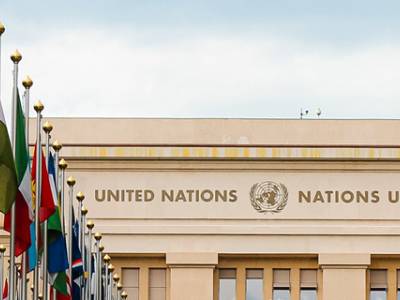@ Good Gosh,
Thanks for your answer. However, if you read carefully my previous message, you will realize that I pointed out at least two times "among the BEST law schools". Obviously, you cannot compare universities of the global south (Latin-America, Africa or Asia) with US or UK top law schools because the difference is huge even though institutions from the former may win this kind of competitions occassionally. They are not at the same league. So your question about if the Andes is better than UCL seems to be rhetorical and, with due respect, a little out of context. The answer is quite obvious.
However and, this is my opinion, what you can do is to compare universities which are at the same level. Here the differences are subtle and any argument in favour of one or the other counts.
About the frecuency of participation in Jessup, at least in the last ten years universities such as CLS, HLS, NYU, Oxbridge have often participated. So why Columbia has been successful several times and not NYU which is supposedly number 1? Not even once!!! I guess the answer has to do something with quality of students and of courses in international law.
Should you take your time, you can download Jessup files in which it is precised how far those universities reached in recent competitions.
When you say that this kind of results is arbitary, you can also say the same about rankings, opinions included on this board, etc, etc.
Jessup competition is a good place to integrate research and litigation skills. Participants are evaluted by a pannel consisting of experts from different institutions and organizations. So how arbitrary is when a university reaches four times the final winning three of them??
And, as I said, these results may be ONLY one point, among many others, to think over when choosing a place to study LLM in international law.
LLM in Public International law
Posted Apr 28, 2010 12:42
Thanks for your answer. However, if you read carefully my previous message, you will realize that I pointed out at least two times "among the BEST law schools". Obviously, you cannot compare universities of the global south (Latin-America, Africa or Asia) with US or UK top law schools because the difference is huge even though institutions from the former may win this kind of competitions occassionally. They are not at the same league. So your question about if the Andes is better than UCL seems to be rhetorical and, with due respect, a little out of context. The answer is quite obvious.
However and, this is my opinion, what you can do is to compare universities which are at the same level. Here the differences are subtle and any argument in favour of one or the other counts.
About the frecuency of participation in Jessup, at least in the last ten years universities such as CLS, HLS, NYU, Oxbridge have often participated. So why Columbia has been successful several times and not NYU which is supposedly number 1? Not even once!!! I guess the answer has to do something with quality of students and of courses in international law.
Should you take your time, you can download Jessup files in which it is precised how far those universities reached in recent competitions.
When you say that this kind of results is arbitary, you can also say the same about rankings, opinions included on this board, etc, etc.
Jessup competition is a good place to integrate research and litigation skills. Participants are evaluted by a pannel consisting of experts from different institutions and organizations. So how arbitrary is when a university reaches four times the final winning three of them??
And, as I said, these results may be ONLY one point, among many others, to think over when choosing a place to study LLM in international law.
Posted Apr 28, 2010 13:02
it would seem very arbitrary indeed. for example, one of the funny things about law programmes in the US, columbia included, is that students take these mooting competitions for credit as part of their degrees. that means that all their preparation and participation is counted as part of their studies. in the UK, by contrast, students' mooting preparation is over and above their degree work. another point: US law students are around 5 years or so older than their british counterparts, giving them another advantage.
in any case, it seems that if you want to determine where best to read international law, what matters most is not some mooting competition but rather the faculty at each respective institution..
in any case, it seems that if you want to determine where best to read international law, what matters most is not some mooting competition but rather the faculty at each respective institution..
Posted Apr 28, 2010 13:12
@ Good Gosh,
Thanks for the precision.
In such a situation we could only compare among US institutions. In this case, however, CLS is still ahead.
With regard to difference in age average, can you hyperlink your source? Is there any statistic on this that you can please share?
Last but not least, since Jessup and alike competitions are more practical-oriented, we can come to the conclusion of how important is in the US law schools the building of practical skills and not only academic ones. This may actually be a weakness of UK law schools in international law and your comment indeed helped to notice it.
Thanks for the precision.
In such a situation we could only compare among US institutions. In this case, however, CLS is still ahead.
With regard to difference in age average, can you hyperlink your source? Is there any statistic on this that you can please share?
Last but not least, since Jessup and alike competitions are more practical-oriented, we can come to the conclusion of how important is in the US law schools the building of practical skills and not only academic ones. This may actually be a weakness of UK law schools in international law and your comment indeed helped to notice it.
Posted Apr 28, 2010 13:29
re: age difference: law is generally read by undergraduates in the UK, whereas it's read by graduates in the US. JDs in the US tend to be 24/25, LLBs in the UK are 19/20.
as for the different emphasis on practical study, i wouldn't go that far. the main point is that in the UK you only get academic credit for academic work. if you intend to practise at the bar, for example, it is expected of you to moot anyways, but it won't count as part of your degree. extracurriculars such as mooting are precisely that: activities undertaken over and above regular academic study.
as for the different emphasis on practical study, i wouldn't go that far. the main point is that in the UK you only get academic credit for academic work. if you intend to practise at the bar, for example, it is expected of you to moot anyways, but it won't count as part of your degree. extracurriculars such as mooting are precisely that: activities undertaken over and above regular academic study.
Posted Apr 28, 2010 13:37
Thanks for the answers and good luck with your LLM studies. At the end of the day, universities mentioned in our discussion are all excellent and you cannot go wrong by attending any of them.
Posted Apr 28, 2010 13:57
yep, they're all fantastic institutions, and anyone in a position to choose is very lucky indeed...
Posted Apr 28, 2010 14:18
Something that should be considered as a criterion to establish which institution may be considered the best in public international law among TOP law schools is international law moot court competitions results. ... the results of the best law schools such as Columbia, NYU, Harvard, Oxford and Cambridge are as follows:
Columbia: 3 times winner (2006, 1965, 1963) 1 time second place (2010)
Dear ILAW,
Your originality is commendable, but your argument not very strong. Even if you you asume that the Jessup is a good indicator of how good a School is at teaching international law, which I don't think is the case, your figures also show other interesting facts. For example, the statistics would show that places like the National University of Singapore (4 times winner) and the University of Texas (4 times winner, ooops!) are THE places to study international law. Not a very sound conclusion...
Secondly, how come Columbia won two of those in the 60's and then it took them more than 40 years to win again? Does it mean that the "old" Columbia is was far superior to the "new" Columbia? More importantly why assume that other Schools were taking the Jessup competition seriously back in the 1960s? And wouldn't the figures also prove that those universities from Australia and some developing countries (Singapore, Venezuela and Colombia in particular) are on par or, oh my God!, even superior than those universities which are supposed to be at the top?
As far as I know, the Jessup only became a real global competition in the 90's and teams from developing countries have proved quite good at them lately. This is a testament to the brain power that lies outside of the US. So why is this a new phenomenom? My guess is that: 1) only a handful of teams from elite unis participated at the beginning of the Jessup, and were then displaced by the more motivated foreign students that came into the picture; and 2) the Internet brought parity in the preparation: universtities from developing countries rarely have the right books, a problem which was considerably alleviated with the modern technologies.
I would argue that a far superior indicator than the "winning the Jessup ranking" would be to determine how many of the Uni's students work successfully on the international law field. Happy do discuss further if somebody finds hard figures.
Cheers
Columbia: 3 times winner (2006, 1965, 1963) 1 time second place (2010)
</blockquote>
Dear ILAW,
Your originality is commendable, but your argument not very strong. Even if you you asume that the Jessup is a good indicator of how good a School is at teaching international law, which I don't think is the case, your figures also show other interesting facts. For example, the statistics would show that places like the National University of Singapore (4 times winner) and the University of Texas (4 times winner, ooops!) are THE places to study international law. Not a very sound conclusion...
Secondly, how come Columbia won two of those in the 60's and then it took them more than 40 years to win again? Does it mean that the "old" Columbia is was far superior to the "new" Columbia? More importantly why assume that other Schools were taking the Jessup competition seriously back in the 1960s? And wouldn't the figures also prove that those universities from Australia and some developing countries (Singapore, Venezuela and Colombia in particular) are on par or, oh my God!, even superior than those universities which are supposed to be at the top?
As far as I know, the Jessup only became a real global competition in the 90's and teams from developing countries have proved quite good at them lately. This is a testament to the brain power that lies outside of the US. So why is this a new phenomenom? My guess is that: 1) only a handful of teams from elite unis participated at the beginning of the Jessup, and were then displaced by the more motivated foreign students that came into the picture; and 2) the Internet brought parity in the preparation: universtities from developing countries rarely have the right books, a problem which was considerably alleviated with the modern technologies.
I would argue that a far superior indicator than the "winning the Jessup ranking" would be to determine how many of the Uni's students work successfully on the international law field. Happy do discuss further if somebody finds hard figures.
Cheers
Posted Apr 28, 2010 15:09
@ oldtimer,
Thanks for joining the debate. As I said before -I am getting tired of repeating it- the Jessup and similar competitions may be one but not the only factor to be evaluated.
And, also again, one can compare universities which based on factors such as professors, prestige, rankings, courses, etc are at the same level. You make a mistake when you compare universities whose programs are not match for institutions like CLS, HLS, Oxbridge, NYU, LSE regardless of their success on Jessup and similar moot courts.
A second point, if you are really informed of international law, you must know that many of the participants in Jessup or other moot courts competitions end up working in international law field. So you should not underestimate the importance of these events as a landmark in an international career. It is not only the competition as such but what you can obtain from it: contacts, internship offers and then job offers.
Last point, unless you are inside an international organization, you cannot easily get access to data on universities of procedence of its staff. However, let me tell you that in the international organizations in which I have been an important number of legal officers and interns were from New York based universities.
That is why I decided to enrol at Columbia and not in HLS or Oxbridge even after being accepted in all of them.
Nevertheless, as I said before, all of them are terrific options and depending on what is your concrete area within the vast universe of international law, where you want to work, whether you seek to be an academic or a practitioner, etc, etc any of those can be the best for YOU and for YOUR plans.
Thanks for joining the debate. As I said before -I am getting tired of repeating it- the Jessup and similar competitions may be one but not the only factor to be evaluated.
And, also again, one can compare universities which based on factors such as professors, prestige, rankings, courses, etc are at the same level. You make a mistake when you compare universities whose programs are not match for institutions like CLS, HLS, Oxbridge, NYU, LSE regardless of their success on Jessup and similar moot courts.
A second point, if you are really informed of international law, you must know that many of the participants in Jessup or other moot courts competitions end up working in international law field. So you should not underestimate the importance of these events as a landmark in an international career. It is not only the competition as such but what you can obtain from it: contacts, internship offers and then job offers.
Last point, unless you are inside an international organization, you cannot easily get access to data on universities of procedence of its staff. However, let me tell you that in the international organizations in which I have been an important number of legal officers and interns were from New York based universities.
That is why I decided to enrol at Columbia and not in HLS or Oxbridge even after being accepted in all of them.
Nevertheless, as I said before, all of them are terrific options and depending on what is your concrete area within the vast universe of international law, where you want to work, whether you seek to be an academic or a practitioner, etc, etc any of those can be the best for YOU and for YOUR plans.
Posted Apr 28, 2010 22:30
@ oldtimer,
Thanks for joining the debate. As I said before -I am getting tired of repeating it- the Jessup and similar competitions may be one but not the only factor to be evaluated.
R/ Agreed. But, as I also said before, I would not give too much weight to this.
And, also again, one can compare universities which based on factors such as professors, prestige, rankings, courses, etc are at the same level.
R/ And how do you determine if universities are "at the same level"? What you can determine is which ones are in the same jurisdiction. US universities and Oxbridge are important insofar as you intend to practice in the US or the UK, but I would not that automatically makes them "the best" law schools in the World. Why? Because we are comparing apples with oranges. As you well know, Universities train you for law as specifically applied in a particular country. And even if you compare within the same country, your response fails to explain why the University of Texas wouldn't be an interesting choice when looking solely at your proposed benchmark.
You make a mistake when you compare universities whose programs are not match for institutions like CLS, HLS, Oxbridge, NYU, LSE regardless of their success on Jessup and similar moot courts.
R/ Why is it a mistake? Why is it that winning the Jessup competition does not prove that they are producing "better international law lawyers" according to your own definition? It seems to me like cherry picking. It also seems to me a bit arrogant to say other law schools are no "match" for HLS, CLS and Oxbridge, in particular when most of the other legal systems are not based on the common law.
What you do have is a flow of plenty of good students whose foreign trainining was good enough to allow them to practice law in the US after getting an LLM, but you do not have many US lawyers going abroad to be able to determine if their education was good enough to thrive in a foreign legal system. I would not underestimate the quality of other law schools, in particular but not limited to the european ones, just because they are not in the US or the UK.
A second point, if you are really informed of international law, you must know that many of the participants in Jessup or other moot courts competitions end up working in international law field
R/ This is affirmation is speculative in nature and lacking proof (not to mention its ad hominem nature). Evidently, Jessup competitors would probably like to work in the area (if they did not have an interest, they would not be competing), but that does not automatically mean that they were succesful in landing a job on international law.
So you should not underestimate the importance of these events as a landmark in an international career. It is not only the competition as such but what you can obtain from it: contacts, internship offers and then job offers.
R/ On this I agree with you. But it is completely different from your original claim (i.e. that Jessup results show the quality of education of the University). If this were to prove anything is that competing in Jessup is important, not that X or Y university is better.
Last point, unless you are inside an international organization, you cannot easily get access to data on universities of procedence of its staff. However, let me tell you that in the international organizations in which I have been an important number of legal officers and interns were from New York based universities.
R/ Interesting. I work in an international organization in which I only three of the 600 employees where trained in NY, two of them in NYU (including myself). I do not know anybody working here who has being trained in Columbia. Moreover, there are hundreds of people who were not trained at all in the US nor the UK and still managed to have a career dealing with international law issues. I guess it all depends which international organization you look at. It gives me the impression that you looked at the UN in NY, which might explain the geographical bias in your observation.
That is why I decided to enrol at Columbia and not in HLS or Oxbridge even after being accepted in all of them.
R/ I am glad you like your decision and that you considered it carefully. What has made jump to respond to some of your comments is your insistance to put into question the quality of NYU's education or to classify it as a second class place to study. Columbia is a great school, but it does not mean that it is the only choice nor that NYU is a bad choice. The judges are out there on which one is best.
Nevertheless, as I said before, all of them are terrific options and depending on what is your concrete area within the vast universe of international law, where you want to work, whether you seek to be an academic or a practitioner, etc, etc any of those can be the best for YOU and for YOUR plans.
R/Agreed. I am glad to see you views have been evolving from a few months ago.
Thanks for joining the debate. As I said before -I am getting tired of repeating it- the Jessup and similar competitions may be one but not the only factor to be evaluated.</blockquote>
R/ Agreed. But, as I also said before, I would not give too much weight to this.
<blockquote>And, also again, one can compare universities which based on factors such as professors, prestige, rankings, courses, etc are at the same level. </blockquote>
R/ And how do you determine if universities are "at the same level"? What you can determine is which ones are in the same jurisdiction. US universities and Oxbridge are important insofar as you intend to practice in the US or the UK, but I would not that automatically makes them "the best" law schools in the World. Why? Because we are comparing apples with oranges. As you well know, Universities train you for law as specifically applied in a particular country. And even if you compare within the same country, your response fails to explain why the University of Texas wouldn't be an interesting choice when looking solely at your proposed benchmark.
<blockquote>You make a mistake when you compare universities whose programs are not match for institutions like CLS, HLS, Oxbridge, NYU, LSE regardless of their success on Jessup and similar moot courts.</blockquote>
R/ Why is it a mistake? Why is it that winning the Jessup competition does not prove that they are producing "better international law lawyers" according to your own definition? It seems to me like cherry picking. It also seems to me a bit arrogant to say other law schools are no "match" for HLS, CLS and Oxbridge, in particular when most of the other legal systems are not based on the common law.
What you do have is a flow of plenty of good students whose foreign trainining was good enough to allow them to practice law in the US after getting an LLM, but you do not have many US lawyers going abroad to be able to determine if their education was good enough to thrive in a foreign legal system. I would not underestimate the quality of other law schools, in particular but not limited to the european ones, just because they are not in the US or the UK.
<blockquote>A second point, if you are really informed of international law, you must know that many of the participants in Jessup or other moot courts competitions end up working in international law field</blockquote>
R/ This is affirmation is speculative in nature and lacking proof (not to mention its ad hominem nature). Evidently, Jessup competitors would probably like to work in the area (if they did not have an interest, they would not be competing), but that does not automatically mean that they were succesful in landing a job on international law.
<blockquote>So you should not underestimate the importance of these events as a landmark in an international career. It is not only the competition as such but what you can obtain from it: contacts, internship offers and then job offers.</blockquote>
R/ On this I agree with you. But it is completely different from your original claim (i.e. that Jessup results show the quality of education of the University). If this were to prove anything is that competing in Jessup is important, not that X or Y university is better.
<blockquote>Last point, unless you are inside an international organization, you cannot easily get access to data on universities of procedence of its staff. However, let me tell you that in the international organizations in which I have been an important number of legal officers and interns were from New York based universities.</blockquote>
R/ Interesting. I work in an international organization in which I only three of the 600 employees where trained in NY, two of them in NYU (including myself). I do not know anybody working here who has being trained in Columbia. Moreover, there are hundreds of people who were not trained at all in the US nor the UK and still managed to have a career dealing with international law issues. I guess it all depends which international organization you look at. It gives me the impression that you looked at the UN in NY, which might explain the geographical bias in your observation.
<blockquote>That is why I decided to enrol at Columbia and not in HLS or Oxbridge even after being accepted in all of them.</blockquote>
R/ I am glad you like your decision and that you considered it carefully. What has made jump to respond to some of your comments is your insistance to put into question the quality of NYU's education or to classify it as a second class place to study. Columbia is a great school, but it does not mean that it is the only choice nor that NYU is a bad choice. The judges are out there on which one is best.
<blockquote>Nevertheless, as I said before, all of them are terrific options and depending on what is your concrete area within the vast universe of international law, where you want to work, whether you seek to be an academic or a practitioner, etc, etc any of those can be the best for YOU and for YOUR plans. </blockquote>
R/Agreed. I am glad to see you views have been evolving from a few months ago.
Posted Apr 29, 2010 01:19
Dear Oldtimer, Just one thing: I referred to international organizations outside US so no bias -as you said- related to NYC location. About the rest of your answers I respect them as I expect you respect mine. Good luck and goodbye.
Related Law Schools
Other Related Content
A Dive Into Public International Law LL.M.s
Article Aug 30, 2017
We take a closer look at the current LL.M. landscape for public international law and how to pick the best program.
Top LL.M. Programs for Public International Law
Top List
Public International Law addresses the relationships—and the conflicts that arise between—nations. Here are the list of the best LL.M. programs for Public International Law
Hot Discussions
-
Stanford 2024-2025
Nov 07, 2024 35,066 117 -
Oxford 2025-2026 BCL/MSCs/MJUR/MPHIL/MLF
Nov 15 04:43 AM 2,049 44 -
Warwick or Birmingham
Nov 10, 2024 1,162 5 -
NUS LLM cohort 2025/26
Nov 17 05:40 PM 471 5 -
LL.M. Scholarship Rates?
Nov 09, 2024 2,503 5 -
Scholarship Negotiation Strategy (BCL v. NYU LLM Dean's Graduate Scholarship)
Nov 09, 2024 1,038 4 -
EU citizen barred in the US -- will an LLM from an EU school help me practice law somewhere in the EU?
Nov 15 12:58 AM 137 4 -
NUS vs Peking
Nov 09, 2024 183 4





